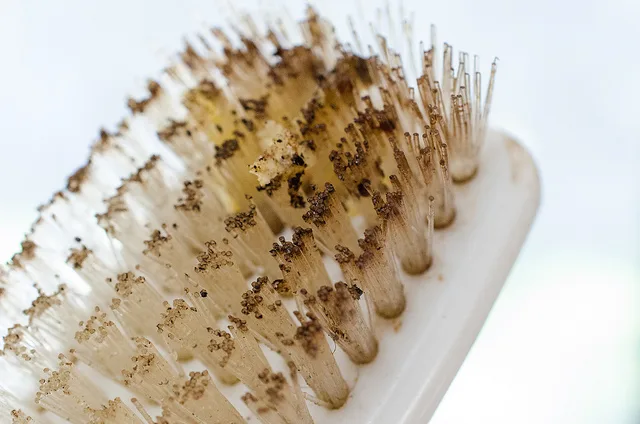
Molly Maid pros explain how to properly clean a scrub brush to maintain its effectiveness.
|
Many of us often wonder how often we should replace our sponge or which cleaning item is the most sanitary for dish washing. According to the Wall Street Journal, a kitchen sponge can be 200,000 times dirtier than a toilet seat and can host up to 10 million bacteria per square inch! That being said, no one wants a brush festered with bacteria because it could be worse than not washing at all– that’s why it is imperative that you maintain sanitary brushes and sponges.
Between brushes, sponges and cotton cloths, brushes are generally the most sanitary. But all three can quickly become slimy with bacteria. keep the following rules of thumb in mind when washing dishes in the future:
Does It Smell?
The first and easiest warning sign of an unsafe brush is the smell. If your brush or sponge has even the slightest sour smell, it’s time to toss it. The bacteria has already settled into the fibers of the sponge, and you will never be able to complete sanitize it. If you’re using a dish rag, make sure to wash it with bleach and warm water before using again.
1-1-4 Rule
We do not recommend waiting until your sponge is smelly and sour to replace it. Keep in mind that bacteria can be spreading before your brush even starts to smell. There are a few things that will expedite the rapid growth of bacteria within your sponge — Keeping your sponge moist is the easiest way for your brush to grow bacteria. That’s why we recommend the 1-1-4 rule: Let your sponge dry out completely at least 1 time per week, sanitize your sponge in the dishwasher or microwave at least 1 time per week, and replace your brush or sponge once every 4 weeks. Remembering the 1-1-4 rule will make sure your dish cleaning routine is safe and sanitary.
Cross Contamination
Lastly, cross contamination is crucial to avoid when maintaining a safe, clean kitchen. Using the same dish cloth on dishes and countertops can spread bacteria across surfaces. Make sure you have designated sponges for each surface of your kitchen. It is also extremely important to avoid wiping up any chicken or red meat juices with anything other than a disposable paper towel. It is very dangerous to cross contaminate bacteria from meat around your kitchen.
Still need help cleaning your kitchen? No problem! Combine these tips with Molly Maid’s cleaning service to ensure a fresh smelling home. Request an estimate from your local Molly Maid today.
